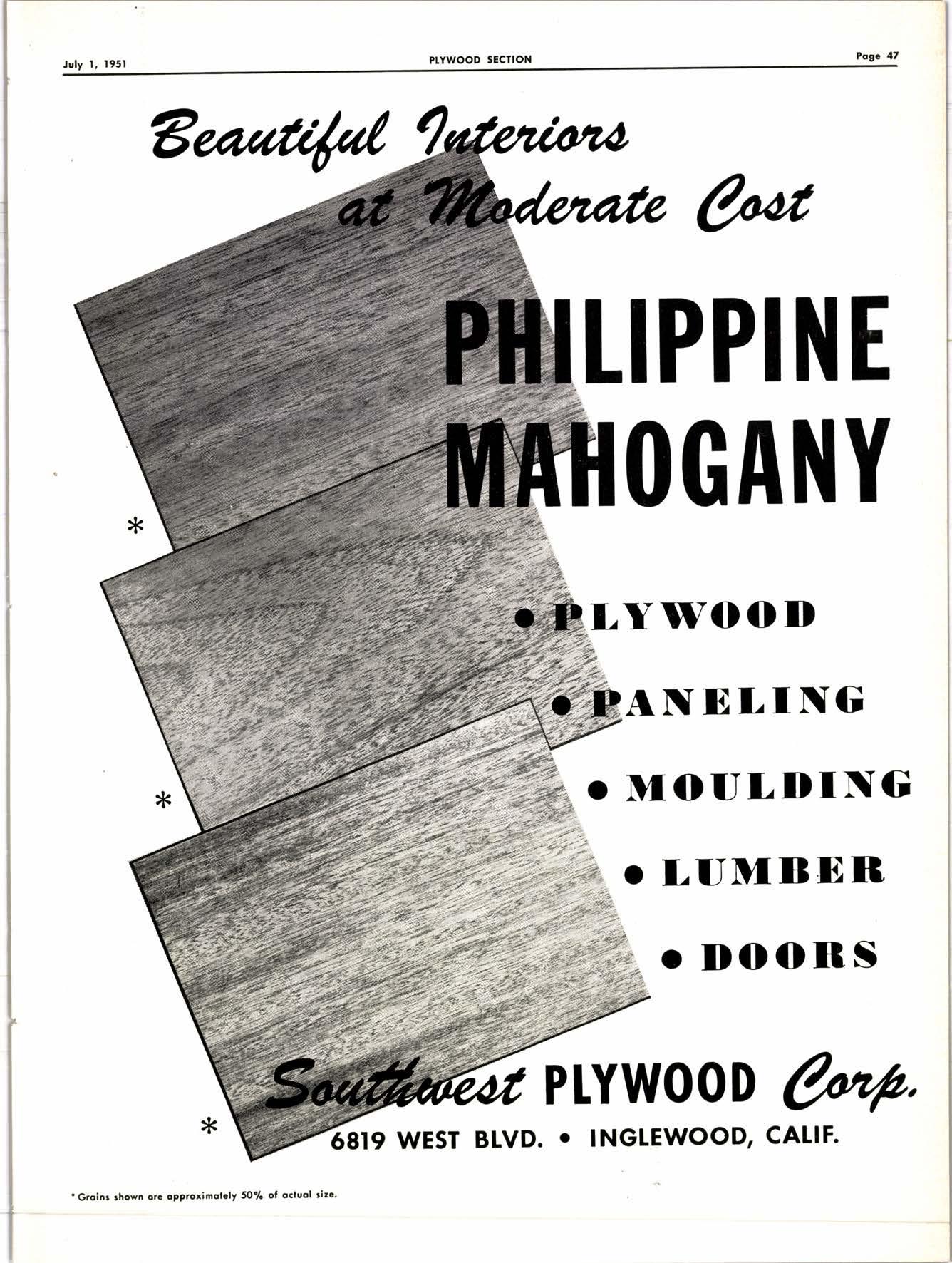
3 minute read
Features Plastic Faced Plywood on W.rehouse Exterior
The new wholesale branch building materials warehouse of North-Robbins Plywood Inc., at Salinas, Calif., features plastic faced plywood on the exterior. The warehouse occupies i1,@0 square feet of floor space.
The large loading and unloading dock will accommodate two fifty-foot cars and four or five trucks at the same time, also there is ample room available off the highway for trucks to maneuver easily to the loading dock. The com- pany handles plywood, doors, both fir and hardwood, insulation, wall board, oak flooring, Masonite products and nails.
A. H. (Art) Neher, a graduate architect with long experience in wholesaling building materials throughout the Western states, is manager of the Salinas operation.
The firm also has distributing plants at Seattle and Spokane, Wash.
DOUGI.AS TIR
Interior . Exterior . Plyscord . Plypcnel . Plylorm

Plywood & \Tallboard lndustries
In the Jordan Valley, deep in the rural hinterland of Israel, there is growing into size and prominence at the present time, a flourishing industry; the manufacture of Plywood and wallboard. No more surprising surroundings for a modern industry could well be imagined.

This is the Valley through which flows the historic River Jordan, basis of so many hymns and religious songs. "Roll Jordan, ro1l," is one of the original and popular spiritual songs of the South. It is a tapering Valley, three miles narrow at one end, and not more than twelve miles wide at any point. It is generally a verdant area, except where it flows into the Dead Sea, which portion is saline and barren. Throughout the Valley can be found evidence of ancient viaducts that once were used for carrying water to what must have been then a highly cultivated land.
And here a remarkable manufacturing industry is growing. In the torvn of Afikim, which is a collective agricultural settlement in the Valley, is an already flourishing Plywood manufacturing industry, which is now in the process of being greatly enlarged and expanded. Today it furnishes all the Plywood used in Israel and is doing considerable exporting of that material; and tomorrow it will be three times its present size, and plans to export Plywood and rvallboard products to much of the rest of the world.
The Afikim Plywood industry at present consists of a modernly equipped Plywood plant that manufactures two million square feet of Plywood monthly, employs 150 people, half of them immigrants, and is at present constructing additional equipment that will double the production, and the number of employees. And, at the same time, they have started construction at Afikim of a sister factory and industry that will manufacture large quantities of hardboard and insulating board. The Kelet Plywood Plant is the institution around which is being built this greater set-up.
Founded before World War II as a small fruit box factory, the project was originally conceived as an auxiliary rnethod of augmenting the collective's farm income. A small r,r,'orkshop employing just four people was the original operation. It macle fruit and vegetable crates out of local Eucalyptus timber. Then, in 1946, it was converted into a well equipped Plywood plant, using hardwoods from Africa, Yugoslavia, France, and Canada, as well as Eucalyptus for raw materials. Glue for the operation is manttfactured in a special plant right there in the local settlement. Soon the Kelet plant was turning out two million feet of excellent Plywood monthly, supplying all the needs of Israel for that kind of material. And recently, with board to spare above their local needs, they began exporting their products into various other countries, including the United States.
Recently they sold to American buyers $250,000 worth of their best Plywood, mostly Birch and Beech.
The extension and enlargement program is now well under way. With the help of funds from the American Export-Import Bank they are building an additional Plyrvood rnill, equipped with the most modern machinery made in the United States, which will double their Plywood production. And they are likewise constructing at a cost of $2,400,000 a factory for the manufacture of hardboard and insulation board, to work in close conjunction with the Plywood department. For raw material for hardboard and insulation they will use local Eucalyptus, which is to be had in great volume, as well as the waste products from the Plywood mills.
(Continued on Page 56)











